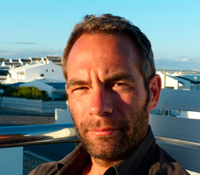New research project at CAS granted DKK 5,9 mill
The Danish Council for Independent Research has awarded a DFF-Research Project Grants to a new research project headed by Honorary Research Fellow Martin Skrydstrup. The project is to investigate the value chains of certified sustainable tea production
Honorary Research Fellow Martin Skrydstrup is awarded a grant of DKK 5,9 million for his new research project ‘Sustainability in Question: Transnational Standards and National Designs of Tea in Postcolonial Kenya’.
 The award is one of the DFF-Research Project Grants from The Danish Council for Independent Research which aims at providing researchers in Denmark with the best possible conditions for producing outstanding, innovative research at the highest international level.
The award is one of the DFF-Research Project Grants from The Danish Council for Independent Research which aims at providing researchers in Denmark with the best possible conditions for producing outstanding, innovative research at the highest international level.
The project will focus on local translations of transnational sustainability standards in Kenya, the United Arab Emirates and various corporate headquarters in Europe to advance understandings of the global value chain of certified tea. Who benefits from which sustainability standards? And how does certification shape agrarian production in the form of cultivation and factory processing?
Post-colonial succes story
"The ambition is to contribute to a new understanding of the relationship between consumption and production in a global perspective. Tea production in Kenya is particularly interesting as an example of the global trade infrastructure as it has developed from an imperial implant to a post-colonial success story. Under British rule, indigenous Kenyans were banned from tea farming, as it was seen as the business of experts, ie white settlers. But today, small cooperatives with local farmers are responsible for more than 70% of the total export from the country,” says Martin Skrydstrup.
Martin Skrydstrup and two postdoctoral researchers, supported by an international advisory board, will investigate these issues historically and ethnographically by following certified and non-certified sustainable tea from the fields to the auctions.
The project is planned to run for two and a half years, and will be housed at the Centre of African Studies, Copenhagen University.
Related News
Contact
Martin Skrydstrup
Honorary Research Fellow
mcs@teol.ku.dk
Telefon: +45 35 33 19 92
